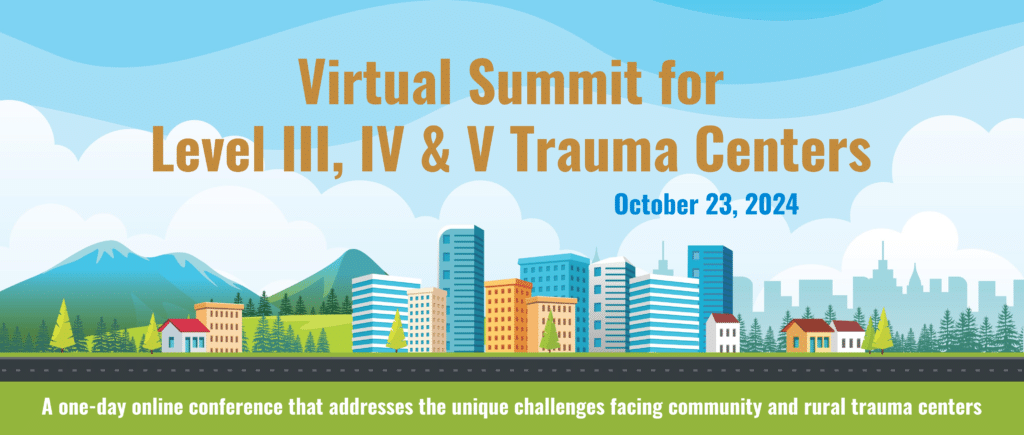
The new Virtual Summit for Level III, IV & V Trauma Centers is a one-day online conference that focuses on the unique leadership and management challenges facing community and rural trauma centers. The summit will take place on October 23, 2024, and attendees will be eligible for Continuing Education credits.
If you are part of the leadership team at a Level III, IV or V trauma center — or if you play a leadership role in an inclusive trauma system — this conference is designed to help you…
> Overcome staffing limitations to improve quality, patient care and program efficiency
> Leverage clinical relationships and system collaboration to “do more with less”
> Network with — and learn from — community and rural trauma colleagues from across the U.S.
To register for the Virtual Summit for Level III, IV & V Trauma Centers, visit Virtual Summit Registration
Continuing Education designed for community and rural trauma leaders
The Virtual Summit’s educational agenda covers a full range of leadership and management issues in community and rural trauma.
Attendees will be eligible for 8 CE contact hours from the California Board of Registered Nursing. As a registered attendee, you can view the live broadcast on October 23 (8 a.m. to 5 p.m. US Central time) — and you will also be able to access all sessions on demand for 12 months following the event.
To view the educational agenda and speakers, click the titles below:
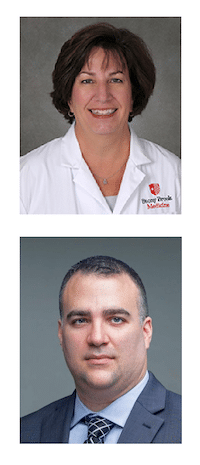
All trauma centers must have a process for assessing quality and improving performance. However, community-level and rural centers typically have much fewer resources available to devote to trauma performance improvement (PI). This session will show how trauma program leaders at a Level III center developed a strategic approach to conducting robust PI with limited program staff. The keys are to identify and understand your available resources, build effective relationships with other services, and leverage reporting capabilities to assess performance, ensure loop closure and demonstrate standards compliance.
At the end of this session, attendees will be able to:
> Create a plan for assessing their center’s available resources for trauma PI
> Implement three proven processes for conducting trauma PI more efficiently
> Build relationships with key Clinical Liaisons to drive clinical practice change
> Use registry data to effectively assess performance and demonstrate loop closure
Presenters:
Jane McCormack, RN, BSN, TCRN is the trauma program manager at NYU Langone Hospital — Long Island, a Level III trauma center in Patchogue, New York.
Jerry Rubano, MD is the trauma medical director at NYU Langone Hospital—Long Island, a Level III trauma center in Patchogue, New York.

The expense of maintaining a trauma center designation is substantial. Yet properly managed, trauma centers at any level can be profitable. Whether your center has a Level I, II, III, IV or V designation, the trauma program can not only cover its own readiness costs but contribute substantially to the hospital’s overall financial viability. This presentation will provide trauma leaders with the foundational knowledge needed to assess the financial performance of their center. Attendees will learn the key requirements of appropriate trauma coding and billing, and the presenter will share practical tools for optimizing trauma center reimbursement.
After this session, attendees will be able to:
> Optimize charge capture for trauma patients while ensuring strong compliance
> Establish effective processes for coding and billing for trauma services
> Ensure their center is properly using trauma-specific revenue codes
> Quantify the dollar value of your trauma center’s improvement opportunity
> Implement strategies for monitoring your center’s ongoing financial performance
Presenters:
Angela Chisolm, MBA/HCM, BSN, RN, CFRN, TCRN is managing partner of Optimal Healthcare Advisors.
Kristen Marin, MSN, RN, CEN is director of critical care and trauma services at Adventist Health Ukiah Valley, a Level IV trauma center in Ukiah, California.
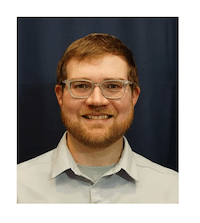
The process of transferring an injured patient to a higher level of care can be complex and time-consuming. In many cases, cumbersome workflows and a poor understanding of EMTALA requirements combine to make the process frustrating for staff and dangerous for patients. This session will clear away the misconceptions and show how Level III, IV, and V trauma centers can use a variety of strategies to streamline both transfers and referrals for trauma patients. Attendees will leave with a better understanding of auto-acceptance policies, one-call implementations, EMTALA regulations, modalities of transfer, and other key issues. The presenter will share tools and best practice guidelines that can be customized to each trauma center and its transportation providers.
At the completion of this session, attendees will be able to:
> Implement effective strategies for streamlining trauma transfers, include one-call and auto-acceptance programs and efficient processes for transferring EMR and imaging data
> Identify the key elements of EMTALA that impact the trauma transfer process in relation to hospital acceptance, transportation decisions and responsibility
> Streamline the selection and activation of interfacility transport teams through auto-response programs, electronic forms and other solutions
Presenter:
Kris Thompson, MHA, RN, NRP, BSN, CCRN, CEN, CFRN, CPEN, FP-C, TCRN is the principal consultant at Black Cloud Solutions, LLC.
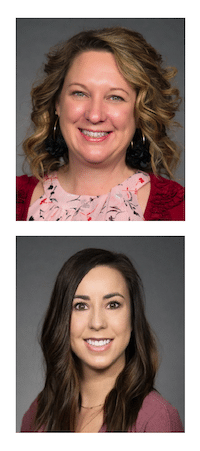
As trauma programs strive to be more fiscally responsible, trauma education must be progressively more innovative to adapt to the financial challenges facing healthcare. Trauma education does not have to be complicated to be effective. This presentation will show you how a community trauma center created a “microburst education” strategy that reduced the cost of trauma education, increased the number of staff educated and decreased the amount of time to accomplish it. Unlike mock traumas which use patient simulation to focus on the clinical aspects of trauma care and can take one to two hours, microburst education takes less than 15 minutes and focuses on the processes and foundational knowledge base of the trauma response team. It consists of dynamic, focused trauma scenarios with detailed objectives based on needs identified through the trauma PIPS program. These focused scenarios, held in the trauma bay, allow for quick, concise and impactful education that results in increased knowledge, increased staff engagement, improved outcomes and happy trauma surgeons. The presenters will share the steps to develop, operationalize and sustain a microburst education program, including tips on how to engage trauma center leadership.
At the end of this session, attendees will be able to:
> Provide on-shift, fiscally responsible trauma education in less than 15 minutes per session
> Develop microburst scenarios customized to your identified performance improvement needs
> Use hands-on practice to reinforce the roles and responsibilities of each trauma team member
Presenters:
Lisa Buckman, MBA, RN, TCRN, CSTR is the trauma data manager for the UCHealth Northern Colorado region, which includes one Level I and three Level III trauma centers.
Elizabeth Mondragon, BSN, RN, CEN, TCRN is the trauma program manager at UCHealth Poudre Valley Hospital, a Level III trauma center in Fort Collins, Colorado.

“Closing the loop” on quality issues is key to effective performance improvement in trauma. In many trauma centers, however, loop closure practices are more complicated than they need to be. This presentation will cover the entire loop closure process, with an emphasis on understanding both simple and advanced strategies for completing each step. The presenter will share realistic ways to identify quality problems, analyze trauma data, develop and implement corrective action plans, and ensure event resolution.
At the completion of this session, attendees will be able to:
> Create a realistic corrective action plan for every trauma PI issue
> Use a five-step process for developing new guidelines and protocols
> Deliver effective provider counseling and document it appropriately
> Identify five pitfalls that undermine loop closure and know how to avoid them
Presenter:
Nancy Bartkowiak, BSN, RN is the trauma program manager at CommonSpirit St. Thomas More Hospital, a Level IV trauma center in Canon City, Colorado.

Survey readiness is a major challenge of trauma center leadership. This session will provide a comprehensive approach to survey preparation, with practical strategies and proven guidance from two key perspectives — the trauma leadership team and the survey team. First, an experienced trauma program manager will break down the survey preparation process and share recommendations for developing an efficient preparation plan. The emphasis is on conducting an up-front gap analysis and creating a manageable system for monitoring progress against trauma center standards. Second, a state trauma system leader will provide unique insights and dozens of tips for a successful survey day. She will outline the key factors that surveyors evaluate during site surveys and showcase best practice examples from successful survey visits. The guidance and recommendations in this presentation are applicable to every leadership team in community and rural trauma, whether you are seeking national verification or state designation.
At the end of this session, attendees will be able to:
> Perform a detailed (and honest) gap analysis of their trauma survey readiness
> Use their gap analysis to monitor and manage an efficient survey preparation process
> Gear their survey prep activities toward the key factors that survey teams will evaluate
> Leverage teamwork, PI results, graphics and more to make an optimal impression on the survey team
Presenters:
Jen Marcotte, BSN, RN, CEN, TCRN is the trauma program manager at Southern New Hampshire Health, a Level III-N trauma center in Nashua, New Hampshire.
Darlene Gondell, MSN, RN, CCRN-K, CNRN, TCRN is the director of accreditation for the Pennsylvania Trauma Systems Foundation (PTSF).

The final session of the Virtual Summit will be a roundtable discussion examining current challenges in community and rural trauma. Session presenters will return to talk about the underlying issues they face as trauma program leaders and share their thoughts on “what is working now” in Level III, IV and V trauma centers. Attendees will have the chance to ask questions about any aspect of trauma program management and trauma system leadership.
This roundtable discussion will be moderated by Shannon Foster, MD, FACS, a trauma surgeon with experience in community-level and rural injury care, and Robert Fojut, editor of Trauma System News.
Moderators:
Shannon Foster, MD, FACS is a trauma and acute care surgeon and critical care physician.
Robert Fojut is the editor of Trauma System News.
Continuing Education: The CE provider for the Virtual Summit is Optimal Healthcare Advisors, LLC. Provider approved by the California Board of Registered Nursing, Provider Number CEP17970, for 8 contact hours.
Refund Policy: Requests for refund must be submitted by email to events@trauma-news.com on or before Tuesday, October 22, 2024 (the day before the Virtual Summit). Cancellations sent after the deadline date will not be eligible for a refund.
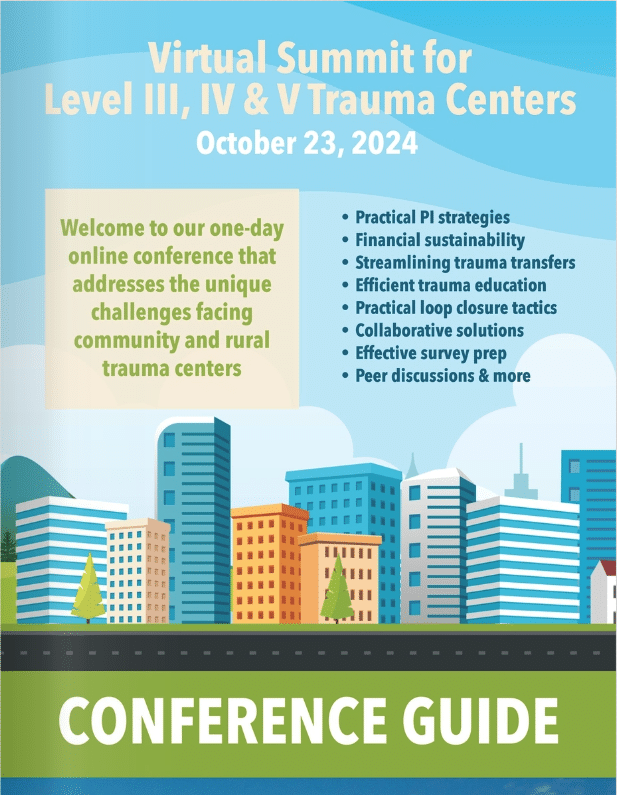
View the Conference Guide in a digital magazine format
The online Conference Guide for the Virtual Summit for Level III, IV & V Trauma Centers contains complete details on educational sessions and presenters — plus a one-page agenda for all four U.S. time zones.
Special early bird and team rates
Early bird pricing will be open for a limited time, and team rates are available.
To view the ticket options and register to attend, visit Virtual Summit Registration or click below:


